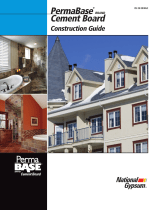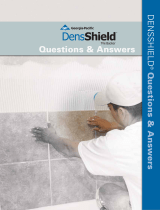Page is loading ...

Gold Bond
®
High Strength LITE
®
Gypsum Board
Technical Information
800.NATIONAL • 800.628.4662
09 29 00 / NGC
Job Name _______________________________________________________________________________
Contractor _____________________________________________________ Date ___________________
Submittal Approvals: (Stamps or Signatures)
DESCRIPTION
Gold Bond® High Strength LITE® Gypsum Board consists of a re-
resistant gypsum core with a heavy, natural nish and 100-percent
recycled paper on the face and back sides. It is formulated to be
25 percent lighter in weight than Gold Bond® 1/2 in. (12.7 mm)
Gypsum Board. The result is a superior board that is both sag
resistant and easier to handle. The face paper is folded around the
long edges to reinforce and protect the core, and the ends are cut
square and nished smooth.
Use it for interior, non-re-rated wall and ceiling applications.
For speed of installation, GridMarX® guide marks are printed on the
paper surface.
BASIC USES
Applications
Use High Strength LITE for walls and ceilings in non-re-rated
construction where framing members are spaced up to 24 in.
(610 mm) o.c.
Advantages
• 25 percent lighter than 1/2 in. (12.7 mm) Gold Bond Gypsum Board,
which results in easier handling.
• Excellent working properties, including improved score and snap,
reduced dust and improved strength-to-weight ratio.
• Excellent sag resistance. Test results show overall sag resistance
on tested assembly to be equivalent to 5/8 in. (15.9 mm) Type X
Gypsum Board.
• Fire-resistant material with a gypsum core that will not support
combustion or transmit temperatures greatly in excess of 212˚F
(100˚C) until completely calcined, a slow process.
• Dimensionally stable under changes in temperature and relative
humidity and resists warping, rippling, buckling and sagging.
• Features the GridMarX preprinted fastening guide on the board to
allow for faster and more accurate installation.
• Achieves GREENGUARD and GREENGUARD Gold Certication.
GREENGUARD Certied products are certied to GREENGUARD
standards for low chemical emissions into indoor air during product
usage. For more information, visit: ul.com/gg.
• Qualies as a low-VOC emitting material by meeting California
Specication 01350. For more information, visit:
calrecycle.ca.gov/greenbuilding/specs/section01350.
INSTALLATION RECOMMENDATIONS
General
• Install gypsum board in accordance with methods described in
ASTM C840 and GA-216.
• Examine and inspect framing materials to which gypsum board is to be
applied. Remedy all defects prior to installation of the gypsum board.
• GridMarX provides quick identication and uniform nail/screw
patterns. Use GridMarX to make accurate cuts without drawing
lines. GridMarX guide marks run the length of the board at ve
points in 4 in. (102 mm) increments. Marks run along the edge
in both tapers and at 16 in. (406 mm), 24 in. (610 mm) and 32 in.
(813 mm) in the eld of the board. The marks cover easily with no
bleed-through using standard paint products.
• Apply gypsum board rst to ceilings at right angles to framing
members, then to walls. Use boards of maximum practical length
so that the minimum number of end joints occur. Bring board edges
into contact with each other but do not force into place.
• Install batt or blanket ceiling insulation before the gypsum board
when installing a polyethylene vapor barrier on ceilings behind the
gypsum board. Install the insulation immediately after the gypsum
board when using loose ll insulation. Avoid installation practices
that might allow condensation to form behind boards.
• Cut gypsum board to allow for a minimum 1/4 in. (6.4 mm) gap
between gypsum board and oor to prevent potential wicking.
• Locate gypsum board joints at openings so that no joint will occur
within 12 in. (305 mm) of the edges of the opening unless installing
control joints at these locations. Stagger vertical end joints. Joints
on opposite sides of a partition should not occur on the same stud.
• Hold gypsum board in rm contact with the framing member while
driving fasteners. Fastening should proceed from center portion
of the board toward the edges and ends. Set fasteners with heads
slightly below the surface of the board. Take care to avoid breaking
the face paper of the gypsum board. Remove improperly driven
nails or screws.
• Provide minimum 1/4 in. (6.4 mm) clearance between boards and
adjacent concrete or masonry to minimize wicking of moisture.
• Maintain a room temperature of not less than 40˚F (4˚C) during
application of gypsum board.
• Maintain a room temperature of not less than 50˚F (10˚C) when
using adhesive to attach the gypsum board and during joint
treatment, texturing and decoration, beginning 48 hours prior
to application and continuously thereafter until completely
dry. Maintain adequate ventilation in the working area during
installation and curing period.
(Continued on page 3)
1

TECHNICAL DATA
Gold Bond
®
High Strength LITE
®
Gypsum Board
2
Physical Properties High Strength LITE
Thickness
1
, Nominal 1/2" (12.7 mm)
Width
1
, Nominal 4' (1,219 mm)
54" (1,372 mm)
Length
1,4
, Standard 8' – 14' (2,438 mm – 4,267 mm)
12' – 14’ (3,657 mm – 4,267 mm)
Weight, Nominal 1.3 – 1.4 lbs./sq. ft. (6.35 – 6.84 k/m
2
)
Edges
1
Tapered or Square
Flexural Strength
1
, Perpendicular ≥ 107 lbf. (476 N)
Flexural Strength
1
, Parallel ≥ 36 lbf. (160 N)
Humidied Deection
1
≤ 10/8" (31.8 mm)
Nail Pull Resistance
1
≥ 77 lbf. (343 N)
Hardness
1
– Core, Edges and Ends ≥ 11 lbf. (49 N)
Bending Radius 10' (3,048 mm)
Thermal Resistance
5
R =.45
Product Standard Compliance ASTM C1396
Fire-Resistance Characteristics
Core Type Regular
UL Type Designation N/A
Combustibility
2
Non-combustible Core
Surface Burning Characteristics
3
Class A
Flame Spread
3
15
Smoke Development
3
0
Applicable Standards and References
ASTM C473 Standard Test Methods for Physical Testing of Gypsum Panel Products
ASTM C518 Standard Test Method for Steady-State Thermal Transmission Properties by Means of the Heat Flow Meter Apparatus
ASTM C840 Standard Specication for Application and Finishing of Gypsum Board
ASTM C1396 Standard Specication for Gypsum Board
ASTM E84 Standard Test Method for Surface Burning Characteristics of Building Materials
ASTM E136 Standard Test Method for Behavior of Materials in a Vertical Tube Furnace at 750˚C
Gypsum Association, GA-214, Recommended Levels of Finish for Gypsum Board, Glass Mat and Fiber-Reinforced Gypsum Panels
Gypsum Association, GA-216, Application and Finishing of Gypsum Panel Products
Gypsum Association, GA-238, Guidelines for Prevention of Mold Growth on Gypsum Board
Gold Bond Building Products, LLC Manufacturer Standards, NGC Construction Guide
1. Specied values per ASTM C1396, tested in accordance with ASTM C473.
2. Tested in accordance with ASTM E136.
3. Tested in accordance with ASTM E84.
4. Please consult your local sales representative for all non-standard lengths and widths. Minimum order requirements may apply.
5. Tested in accordance with ASTM C518.

Gold Bond
®
High Strength LITE
®
Gypsum Board
(Continued from page 1)
Curved Surfaces
To apply gypsum board over a curved surface, place a stop at one
end of the board and then gently and gradually push on the other end,
forcing the center against the framing until the curve is complete.
Shorter radii than shown in the accompanying table may be obtained
by moistening the face and back papers of the board with water and
allowing the water to soak into the core. When the board is dry, it will
regain its original hardness.
Apply gypsum board to curved surfaces in accordance with the
following:
Gypsum Board Bending Radii
Board Size Bending Lengthwise Bending Widthwise
1/2" (12.7 mm) 10' (3,048 mm) —
To achieve tighter ending radii, use Gold Bond® 1/4 in. High Flex®
Gypsum Board.
Finishing
Refer to GA-214, Recommended Levels of Finish for Gypsum Board,
Glass Mat and Fiber-Reinforced Gypsum Panels, to determine the level
of nishing needed to assure a surface properly prepared to accept
the desired decoration.
Decoration
Ensure gypsum board surfaces, including nished joints, are clean,
dust-free and gloss-free to achieve best painting results. Apply a coat
of a quality gypsum board primer to equalize the porosities between
surface paper and joint compound, improving fastener and joint
concealment.
Selection of a paint to provide desired nish characteristics is the
responsibility of the architect or contractor.
Prepare and prime gypsum boards prior to texturing.
Refer to GA-214 to determine the level of nishing needed to ensure a
surface properly prepared to accept the desired decoration.
Critical Lighting Areas
Wall and ceiling areas abutting window mullions or skylights, long
hallways, and atriums with large surface areas washed with articial
or natural lighting are a few examples of critical lighting areas.
Strong side lighting from windows or surface-mounted light xtures
may reveal minor surface imperfections. Light striking the surface
obliquely, at a slight angle, exaggerates surface irregularities. If you
cannot avoid critical lighting, minimize the eects by skim coating
the gypsum board surfaces, by decorating the surface with medium
to heavy textures, or by the use of draperies and blinds, which soften
shadows. In general, paints with sheen levels other than at, enamel
paints and dark-toned paint nishes highlight surface defects;
consider the use of textures to hide these minor visual imperfections.
LIMITATIONS
• Avoid exposure to extreme temperatures. Do not expose gypsum
board to temperatures exceeding 125˚F (52˚C) for extended periods
of time.
• Properly ventilate or condition attic spaces to remove moisture
buildup above gypsum board ceilings. If required, install a vapor
retarder in exterior ceilings behind gypsum board.
• Avoid installing gypsum board directly over insulation blankets with
facer anges placed continuously across the face of the framing
members; recess insulation blankets and attach anges to the
sides of framing.
• Isolate gypsum board from contact with building structure in
locations where structural movement may impose direct loads on
gypsum board assemblies.
• Space control joints no more than 30 ft. (9,144 mm) where
employing long continuous runs of walls, partitions or ceilings
without perimeter relief.
• Avoid gypsum board joints within 12 in. (305 mm) of the corners
of window or door frames unless installing control joints at these
locations.
• All ends and edges of gypsum board should occur over framing
members or other solid backing except where treated joints occur
at right angles to framing or furring members.
• Apply 1/2 in. (12.7 mm) High Strength LITE gypsum board to ceilings
to be decorated with water-based spray texture perpendicular to
the framing, spaced a maximum of 24 in. (610 mm) o.c.
• To prevent objectionable sag in gypsum paneled ceilings, the weight
of overlaid unsupported insulation should not exceed the following
recommendations:
Ceiling-Supported Insulation
Thickness, Nominal 1/2" (12.7 mm)
Framing Spacing 24" (610 mm) o.c.
Weight of Ceiling-Supported Insulation 2.2 psf (10.7 kg/m
2
)
3

4
111151 REV. 01 21
FOR MORE INFORMATION
Architectural Specications
Gold Bond Building Products CSI MasterFormat® 3-part
guide specications are downloadable as editable
Microsoft
®
Word documents at: goldbondbuilding.com.
Latest Technical Information and Update
Visit goldbondbuilding.com or call National Gypsum Company
Construction Services: 1-800-NATIONAL (628-4662).
National Gypsum Company is the exclusive service provider for
products manufactured by Gold Bond Building Products, LLC.
The Gold Bond family of products is manufactured by
Gold Bond Building Products, LLC.
Gold Bond
®
High Strength LITE
®
Gypsum Board
National Gypsum Company is the exclusive service provider for products
manufactured by Gold Bond Building Products, LLC.
Gold Bond Building Products, LLC
2001 Rexford Road
Charlotte, NC 28211
704.365.7300
goldbondbuilding.com
/












